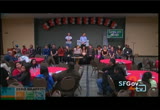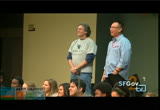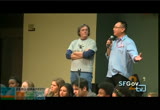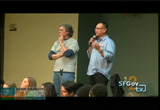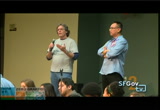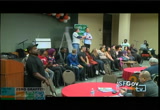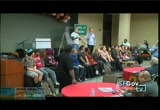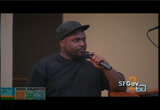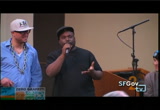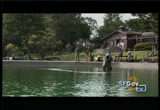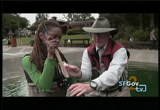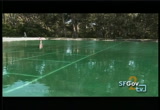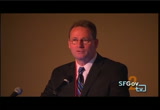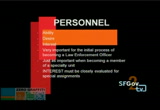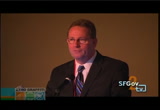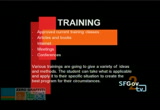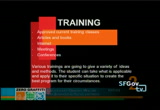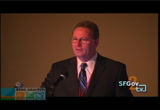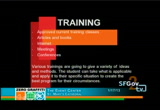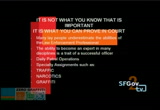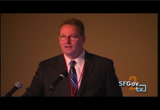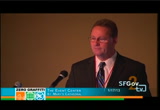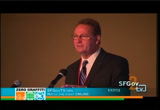tv [untitled] April 20, 2013 7:44pm-8:14pm PDT
7:56 pm
the best fly casting pools in the world. these shallow concrete pools don't have fish. this is just a place where people come to practice their fly casting technique. ith was built in the 1930's and ever since, people have been coming here to get back to nature. every year, the world championship of fly casting is held in san francisco and visitors from all over the globe travel to be here. >> we are here with phil, general manage of san francisco rec and parks department at the anglers lodge. what do you think about this? >> it is spectacular, travis from oregon, taught me a snake roll and a space cast. >> there are people from all over the world come to san francisco and say this is the place to be. >> yeah.
7:57 pm
it's amazing, we have teams from all over the world here today and they are thrilled. >> i flew from ireland to be here. and been practicing since for the competition. all the best casters in the world come here. my fellow countryman came in first place and james is on the current team and he is the head man. >> it's unique. will not see anything like it where you go to compete in the world. competitions in ireland, scotland, norway, japan, russia each year, the facilities here in the park are second to none. there is no complex in the world that can touch it. >> i'm here with bob, and he has kindly agreed to tell me everything i need to know about casting. i'm going to suit up and next, we're in the water. >> what any gentleman should do.
7:58 pm
golden gate angling has free lessons the second saturday of every month. we have equipment show up on the 9:30 on the second saturday of every month and we'll teach them to fly cast. >> ok. we are in the water. >> let me acquaint you with the fly rod. >> nice to meet you. >> this is the lower grip and the upper grip. this is a reel and a fly line. we are going to use the flex of this rod to fling away. exactly as you moved your hands. >> that's it? >> that's it. >> i'm a natural. >> push both arms forward and snap the lower hand into your tummy. push forward. >> i did gave it a try and had great time but i might need some more practice.
7:59 pm
i met someone else with real fly casting skills. her name is donna and she is an international fly casting champion. >> i have competed in the casting ponds in golden gate park in san francisco. i have been to japan and norway for fly casting competition. i spend my weekends here at the club and at the casting pond. it's a great place to learn and have fun. on a season day like this, it was the perfect spot to be. i find fly casting very relaxing and also at the same time very challenging sport. takes me out into the nature. almost like drawing art in the air. and then i can make these beautiful loops out there. >> even though people from across the globe come here to
8:00 pm
8:01 pm
police department, he will be our next key note speakers so please listen to mr. dwight waldo >> thank you, drew, i'm very pleased to be here and i'm pleased to see so many people attending. my program today will basically be on training and expertise, being able to go out, understand the gravanis culture and then take it to court and get a successful prosecution. just a little background, i'm not going to read it all. i pretty much go by sergeant because i was only a lieutenant the last 3 months and i found out if you google me under lieutenant you find something. i stick with sergeant because i have about 14 years on google for that. i spent about 28 years as a police officer for the city of san bernardino, california, about 80 miles outside los angeles. among other things i'm recognized as an expert on
8:02 pm
graffiti in california superior court. without reading all this i want to let you know that i am well rounded, i was supervisor of the unit to be supervisor of a multi agency dealing with it to being executive director for the entire state, california graffiti association of california. so i have a fair amount of background. i first became involved in graffiti back in 1991 when i was told in the gang unit that i was going to be a two-week assignment to deal with these guys called taggers. i continued until i retired so it was a long two weeks. a lot of times cities don't understand how deep the issue goes.
8:03 pm
i have had my card handed out, this is my phone number. i have absolutely no problem with people calling me any time to discuss graffiti issues, graffiti cases, any of that stuff, i am always available. that's why i put my card out there. so first off, before we get into the graffiti part we have to talk about the person whos going to be dealing with graffiti when he goes to court. personnel and training are the two keys to success in any detail, we're going to talk specifically about graffiti but in any assignment as a police officer. when we hire on a police officer we look for 3 things besides integrity, we look for the ability to do the job, the desire to do the job and the interest. if you are missing any of those 3 things eventually the officer will not
8:04 pm
be successful. when i was in personnel we were only hiring about 1 out of every 100 people who applied to the city. so you can see it's a very stringent requirement when you are looking for people to do what you want to have done. this is particularly important when you are initially deciding who wants to be a police officer, we want to get them through the academy, get them through probation and make them successful officers. but it's just as important when becoming a member of a specialty unit. the iplt is really big. there are probably people in this room saying i got graffiti when somebody else wanted it, and that's hard. and there's people like me and the officers i have hired into my units that just love the job and see the value in it, see the value for the community. so you've got to have that interest or else, again, you are going to have not as successful an officer. now you found the officer, you
8:05 pm
got him figured out, i talk a lot about officers but the same applies to civilians, anybody sitting out in this audience. because my concept is anybody can be a graffiti expert and a lot of that comes down to training. where do you find this training? first it's police officers, we get a lot of it through approved training classes, things certified by the state, post-classes and that's fairly consistent in a lot of states that have a group that authorizes what kind of training the officer gets. articles and books, that's fairly self-explanatory. and really you wind up in the next group, which is the internet. there's so much stuff on the internet, if you are curious about anything having to do with graffiti, start googling graffiti stuff. if you get on you tube, put down tag crews fighting, that's not just battling with paint, that's physically fighting with
8:06 pm
altercations. the thing about the internet, sometimes people will ignore some of the major graffiti sites because we're out here to fight graffiti, why do we want to go to a graffiti site. a lot of these guys when they have dedicated graffiti sites like art (inaudible) you can read all kinds of articles written by taggers for taggers trying to train other people to be better vandals. so don't ignore the fact there's stuff out there for the graffiti vandal because that can be of huge use to you. meetings, we hold a monthly task force meeting and our task force meeting pretty much covers everything from santa barbara down to san diego is our main group we have a task force meeting with. we share ideas, it's evolved over the years, become more formal. now
8:07 pm
each time we have a meeting we try to do some new training or talk about the technology available, i will talk about the technology in my class this afternoon. it's really good because we document it because when you go to court, you can show training on a monthly basis. conferences, i can't tell you how excited i am these are happening. only in the last two or three years have these major conferences come about. the one up in canada, they were a great group of conferences and other people started to pick up on this. when i became an officer dealing with gravanis in 1991, there were no conferences and there was virtually no interest. as dr. spicer mentioned, every time it got good, i foupld myself out of a job. i was out of a job for
8:08 pm
about 6 months because it fell apart and then came back together. mer and more cities are realizing gravanis is a pattern crime and as dr. spicer pointed out, it's a great way crime to many other activities. so you can wind up precluding with a lot of other stuff by dealing with them when they are down to the part doing gravanis damage before they escalate to a more violent crime or serious crime. it's nice to attend different trainings. this one here is great because we have people from all over the country, canada and the united kingdom. there are things you are going to listen to when you go, yeah, i would never do that or couldn't do that because of the laws in my political jurisdiction or whatever, we are not allowed to do that. then there's going to be other things when you think, gosh, i never thought about that, i think that would work really good. i'm going to take it back it my jurisdiction.
8:09 pm
probably over the past few years i've got 500 people i've dealt with, officers that have come to the class and subsequently become gravanis experts and set up programs. almost every program is different. a lot of the basis is the same, the information is consistent worldwide but people will tweak what information they are going to use and how they are going to be allowed to operate. some are in plain cars, some in marked units, it all depends how it's going to go. take the information you get, there's so much good information here today and tomorrow, take the information you want, take it back and integrate it into however you are going to work your program. when we come right down to it, it's not important what you know, it's what you can prove in court. probably every officer sitting in this room can say i have an investigation or we did an investigation where we did the investigation, i know the guy was dirty, i
8:10 pm
know he did the crime, you send it to the da and the da says you do not have enough to prove it in court. in my career i had numerous people i believed did homicides that we could not take to court because we did not have enough provable evidence. i think that a lot of lay people underestimate the abilities of law enforcement professionals and maybe it's because i've been a cop 28 years but i think cops are the most adaptable trainable guys i've ever been around, the quality of people in the police ranks is upb deniablely good. it's good that a lot of people underestimate it because a lot of criminals underestimate us and quite often you will finish a long-term investigation where the crime happened 6 months ago and when you are interviewing the guy and he says, i never thought you'd catch me, and they don't. they don't think you will catch them but officers spend the time to do it and again that comes from their training and working with
8:11 pm
it. as a law enforcement officer you are required to come up with expertise in all kinds of disciplines. you come to work as a patrol officer and you walk out on the street, first call you get might be to go to a traffic accident. you have to look at the physics, you have it look at the scene and see what happened. you might leave there and go to narcotics activity, leave there and go to child abuse, a shooting, a stabbing, those are all different crimes. when you think about it, that's a staggering amount of information the officer has to know and he's going to get grilled in court to make sure he knew that information. experts are all made, none of them are born. say an officer goes to traffic, he has a real
8:12 pm
interest in traffic and he's going to do traffic reconstruction and everything up to fatal accidents. for him to be able to do that, he's got to go out to a scene, he has to look at evidence, he has to be basically a map maker to create a diagram about what occurred, he has to look at the weight of the vehicle, the radial skids, apply the laws of physics and come up with a reasonable explanation about what occurred in that accident. same thing, a narcotics officer goes in, he comes in cold. he's going to have to learn things like chemistry because he may walk into an active methamphetamine lab because he's going to make a decision how that lab will be shut down and his decision can affect the lives of everyone walking into that scene. that's quite a bit of a jump to go from a civilian to basically figuring out how you will protect people in a scene like that. so we get to gravanis, there's nothing to gravanis compared to those things. the biggest issue with gravanis over the
8:13 pm
years, when i started in the early 90's is there was very little information out there and it was difficult to come up with consistent information. and i have dedicated a huge amount of my career to creating consistent information that we can take into court. this is kind of a good example because i have an hour to speak up here. anybody who has heard me speak knows an hour is not a whole lot of time for me. but when you good to court, you are going to be in the same situation. when i go to testify in court to take these guys to trial, your time is going to be very limited. in that time, you're going to have to go in there and present simple, understandable concepts as to what is the foundation of your case and you have to go in there and do that to educate the jury and to educate the judge. a lot of these people and the judge have never been in front and had to deal with a gravanis type case. the information should be consistent. you ha
46 Views
IN COLLECTIONS
SFGTV2: San Francisco Government Television Television Archive
Television Archive  Television Archive News Search Service
Television Archive News Search Service 
Uploaded by TV Archive on

 Live Music Archive
Live Music Archive Librivox Free Audio
Librivox Free Audio Metropolitan Museum
Metropolitan Museum Cleveland Museum of Art
Cleveland Museum of Art Internet Arcade
Internet Arcade Console Living Room
Console Living Room Books to Borrow
Books to Borrow Open Library
Open Library TV News
TV News Understanding 9/11
Understanding 9/11